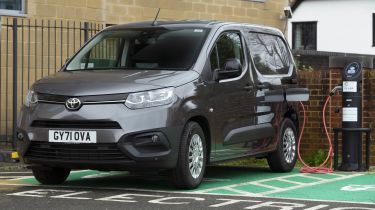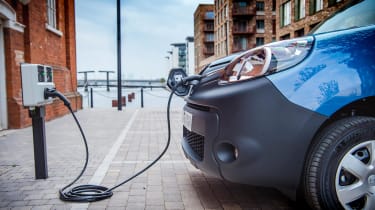Electric van lease deals explained
Thinking about leasing an electric van? Here's a starter guide

Electric vans have increased in popularity over the last few years, due to improvements in battery technology, more models becoming available on the market and many cities installing clean-air zones that charge petrol and diesel commercial vehicles for entering. With the biggest obstacle to EV van adoption still being the price, electric van lease plans are also growing in popularity. Leasing an electric van can prove to be an easy, affordable alternative to outright ownership.
But what is leasing? Leasing is a flexible alternative to purchasing a new van that allows you to spread the cost over a set period of time and hand the vehicle back once the deal expires. Think of it as a long-term rental agreement where customers have no need to worry about the high initial cost price of electric vans.
Under a lease deal, the customer pays an initial payment and then a series of monthly payments over a set period of time, usually ranging between 24 to 60 months. At the end of the agreement, the customer doesn’t need to worry about taking ownership of the van as with other financial agreements such as a PCP, they just hand the van back to the finance provider.
When looking into leasing you will come across Business Contract Hire (BCH) and Personal Contract Hire (PCH) deals. PCH is for normal private customers and BCH is for business use only. Traditionally BCH quotes are shown excluding VAT as businesses can claim back up to 50% of the VAT on the rental for traditional passenger vehicles and 100% of VAT for commercial vehicles.
Some leasing contracts can even factor-in servicing and maintenance so there will be no unexpected expenses throughout the time you are using the vehicle.
What are the benefits of electric vans?
Diesel has been the standard choice for commercial vehicles for decades, these engines are fuel-efficient, possess plenty of torque and are often reliable. While a diesel van will still be ideal for users who are going to be covering a high mileage, EV vans are increasingly better suited to city driving and stop-start delivery routes in urban areas. When it comes to urban use, outright range is not as important as reliability, low running costs, and exemption from fees like the Congestion Charge and Ultra Low Emission Zone.
Electric vans don't produce any emissions and are extremely quiet, so the benefits for local deliveries are clear. The lack of engine noise makes for a quieter and more refined driving experience, too. Whereas diesel vehicles typically emit lots of carbon dioxide and nitrogen dioxide.
Technology is constantly improving, especially now that electric vans are becoming more mainstream. Fleets like British Gas and Royal Mail are currently transitioning to EVs, plus the development of EV vans overlaps with electric cars means that batteries are getting bigger, range is getting longer, charging times are reducing and the variety of available models is broadening.
Besides saving on clean-air zone fees, electric vans could help you save on other everyday costs such as fuel and maintenance – no engine to worry about and fewer moving parts should mean you'll experience fewer mechanical issues. There’s no DPF (diesel particulate filter) to worry about either, plus no costly repairs around soot build up.
While a full charge of electricity will cost much less than an equivalent tank of diesel. If your business doesn’t already have EV chargers installed, you may need to factor in the cost of using public chargers.
How much would it cost to lease an electric van?
Business-specific Contract Hire is the type of lease deal usually offered on vans – it's worth considering as a leasing plan could help you save money. Initial rental costs tend to be cheaper than when buying outright, while concerns like depreciation are no longer a worry as you hand the vehicle back at the end of the agreement. Tax breaks are another great benefit, with half of the VAT paid on the van's finance being eligible to be claimed back.
Remember, as with all leasing or contract hire deals, you won’t ever own the van, rather paying a monthly rental and then returning it to the finance provider after the rental period is over.
What are the best electric vans to lease?
There are lots of EV van options to choose from so figuring out which van is most suitable for your business can be complicated. Just as with buying a van, your decision will depend largely on payload, size, range and cost. If you're looking for a smaller van, some of our favourites are the Vauxhall Combo Electric, Peugeot e-Partner and Citroen e-Berlingo. All three share a platform and can travel up to 171 miles on a charge. Most small electric vans still offer over 100 miles of range. Even taken with a pinch of salt, these figures should be more than enough for most local uses.
If you need a larger van, the options are constantly growing. Once again, Vauxhall, Peugeot and Citroen find themselves at the forefront of the pack with the Vivaro-e, e-Expert and e-Dispatch. All of which are available with the choice of a 50kWh or 75kWh battery, offering 143 and 205 miles of range respectively. Plus, with the network of chargers on UK roads increasing every year, larger-battery vans could even prove a viable choice for longer distances too. Ford’s e-Transit Custom and e-Transit are also highly capable options.
These are some of the best options of electric vans that are currently on sale, but there are even more options on sale and available for lease than you may have imagined. For a full list of all the electric vans we recommend, take a look at a list of the top 10 best electric vans, compiled by our expert testers.

Examples of electric van lease deals
Below are some examples of electric van leasing deals with details of how a BCH (Business Contract Hire) deal would look. All figures shown are excluding VAT.
If you are after a smaller van then as of June 2024 you could lease a Kangoo L1 E-Tech over four years for £228.96 per month. This would require an initial payment of £1,373.76 allowing you to cover 8,000 miles per year but would not cover any maintenance. To get this deal just visit the LeaseLoco website.
If a medium van is what you're after then there you can currently get a Volkswagen ID. Buzz Cargo for 413.37 a month for four years including any servicing you may require. You would need to put in an initial payment of £2,312.57 and you could use it for a maximum of 8,000 miles per year. If this sounds like the perfect deal for you, visit the Vanarama website.
If the medium van still isn’t big enough and you need a large van, you can currently get a Ford E-Transit 350 L4 Rwd that will cost you £591.69 per month over a four year deal with an initial £3,799.14 payment with 8,000 miles a year. Visit the Leasing.com website to find out more.
When searching for a van lease, it's always wise to compare different options to ensure you get the best deal possible. By evaluating multiple offers, you can better understand the market rates and terms available. This comparison can help you make an informed decision, potentially saving you money and ensuring you choose an electric van lease that best meets your needs.
